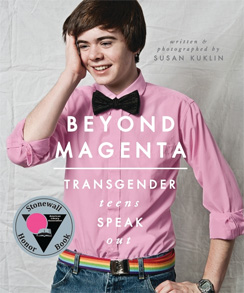Books under attack
From her home office in Manhattan, Susan Kuklin has written about thirty books for children and young adults. Her most recent is called "Beyond Magenta: Transgender Teens Speak Out" (Candlewick Press), about young people who transitioned from one gender to another.
Kuklin said the immediate response when the book was first published was very positive: "Much more than I thought it would be!"
She said she did not receive any notes from parents or community members criticizing the book. It wasn't until she saw her name on a Google Alert that she knew her book was among the top 10 most challenged in the nation.
"CBS This Morning: Saturday" co-anchor Vinita Nair asked, "What do you think it is that people are afraid of, that they wouldn't want their kids exposed to that maybe your book touches upon?"
"This is dangerous knowledge," Kuklin replied. "It's scary to people because they don't understand it. Once you get to understand it, it's no longer frightening. But there's that period before it happens, where there's so much pushback and so much fear. And I think that's what happened with my book."
"Beyond Magenta" was among the Top Ten Most Challenged Books of 2015, as noted in the American Library Association's "State of America's Libraries" report.
Librarian James Larue, who helped compile the list, told Nair that four of the 10 titles were about lesbian, gay, bisexual and transgender issues. (In addition to "Beyond Magenta," they included "Fun Home," by Alison Bechdel, source of the Tony-winning Broadway musical; "I Am Jazz," by Jessica Herthel and Jazz Jennings; and "Two Boys Kissing," by David Levithan).
The list also contains two books about Islam ("Habibi," by Craig Thompson; and "Nasreen's Secret School: A True Story from Afghanistan," by Jeanette Winter); two about mental disability ("The Curious Incident of the Dog in the Night-Time," by Mark Haddon, and "Looking for Alaska," by John Green); the Bible, which Larue says has appeared many times before; and "Fifty Shades of Grey," by E.L. James, which was initially self-published erotica that has since sold more than 125 million copies worldwide.
Nair asked, "What is the broad theme amongst the books that you have people saying, 'These shouldn't be in libraries'?"
"I think it's the outsider," Larue said. "You know, it's whatever part of our society that mainstream Americans still feel some discomfort with.
"It's clear that if you look back over the past year or so, we've had a surge of 'religious liberty' bills, [issues of where] transgender people use a public restroom, or an attempt to, say, adopt the Bible as the state book of Tennessee. So often, [with] actions like this, when any one group steps forward and says, 'It needs to be like this,' then there's a pushback."
Larue says most books stay on the list for about five years, and then become mainstream. The best example: Harry Potter.
The concern when the first Harry Potter books were published, Larue said, "was that this was a glorification of witchcraft and Satanism; it was just this terrible fear that someone would be exposed to a non-Christian worldview, and then being somehow seduced and corrupted by it."
Nair asked Kuklin, "What do you think can be learned just from this list?"
"I think what we're learning is the country is more frightened than we thought it was," she replied. "We're afraid of going forward. Life is changing, science is making changes, politics are changing -- everything's changing. And we can either choose to grow as human beings or stay the same."
Kuklin said when she wrote "Beyond Magenta," there was nothing like it on the market. Now LGBT books are a booming genre.
When asked about being included on the list -- which often increases sales for books in the spotlight -- Kuklin said, "People are all saying to me, 'Congratulations!' And meanwhile, I feel like I've been slapped in the face, so it's really quite odd to hear this."
